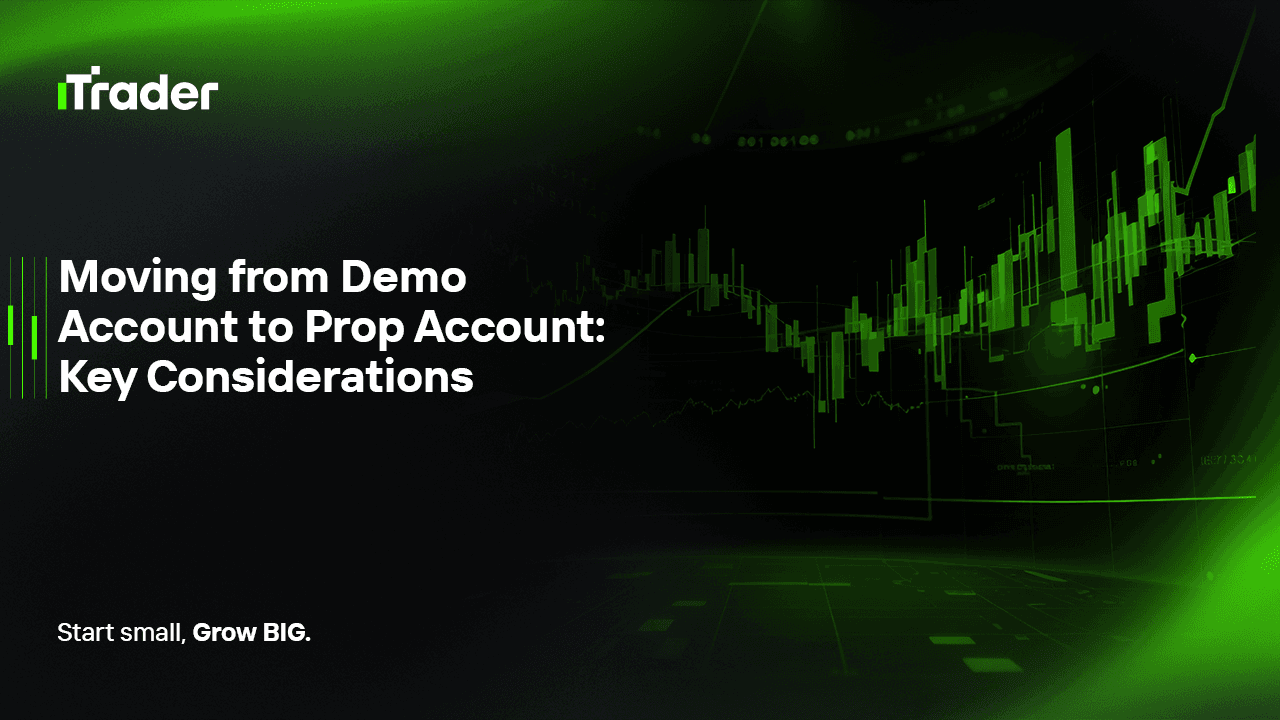2025-09-16
For most aspiring forex traders, the journey begins on a demo account. It’s a safe environment where mistakes cost nothing, strategies can be tested freely, and confidence can be built without the pressure of real money. But at some point, every trader faces the big leap — moving from demo to a prop account, where real capital is on the line and strict rules apply.

This transition isn’t just about proving your technical skills. Prop firms evaluate traders on much deeper levels: risk management, discipline, psychological resilience, and consistency. Passing this phase means showing that you can handle not only the charts but also the emotions, rules, and capital entrusted to you.
In this blog, we’ll break down what you should pay close attention to when making this critical shift, and how to prepare for success in a prop firm environment.
On the surface, demo and prop accounts look similar — you open trades, watch price movements, and manage positions. But the dynamics are very different:
Understanding these differences upfront is essential because many traders stumble not due to lack of skill but due to underestimating the psychological and structural changes.
A demo account is not just for testing whether a strategy “works.” It’s where you build the habits that will carry you through prop challenges. Before attempting a prop account, ensure you’ve:
Think of demo as your rehearsal stage. You don’t pass to the main show (prop account) until you can consistently perform on this smaller stage.
The biggest hurdle in moving from demo to prop is not technical but psychological. When money is real (even if it’s the firm’s), your brain reacts differently:
To manage this shift, you must prepare mentally as much as you prepare technically.
Prop firms don’t care if you make 20% profit in a week. They care if you can protect capital while generating returns. That’s why risk management takes center stage:
In fact, most prop firms would rather see a trader earn 5% with tight drawdowns than 15% with reckless exposure.
The goal in a prop challenge is not to prove you’re a genius trader — it’s to demonstrate you’re a reliable, consistent risk manager. Here’s how to approach it:
Remember: Prop firms are evaluating how you’d handle their money long-term, not just whether you can hit a short-term profit goal.
Moving from demo to prop should not be impulsive. A structured transition plan increases your odds of success:
This staged approach prevents emotional burnout and builds confidence step by step.
Many traders fail prop challenges not because they lack skill, but because they repeat avoidable mistakes:
Awareness of these pitfalls can help you sidestep them.
The demo account is your training ground. The prop account is your audition. Passing it successfully is not the end goal — it’s the beginning of your professional career.
Think of it as stages:
Each stage builds on the previous one. Skipping steps or rushing leads to failure, while gradual mastery leads to long-term success.
Transitioning from demo to prop is one of the most challenging and important steps in a trader’s journey. The skills that served you well on demo — strategy testing, execution practice, risk calculation — now must be reinforced with discipline, emotional control, and strict adherence to rules.
To succeed, remember:
If you respect the process, master your emotions, and trade with consistency, you’ll not only pass prop challenges but also position yourself as a trader capable of long-term growth and professional success.
2025 Ай Трейдер Глобал ХХК | Компанийн бүртгэлийн дугаар: 15962
Ай Трейдер Глобал ХХК нь Комор улсын Анжуан арал дахь Мутсамуду хотын Хамчакод байрлалтай. Тус компани нь Коморын Үнэт Цаасны Хорооноос (Securities Commission of the Comoros) олгосон L15962/ITGL дугаартай тусгай зөвшөөрлийн хүрээнд үйл ажиллагаа явуулдаг.
Ай Трейдер Глобал ХХК нь “iTrader” нэрийн дор үйл ажиллагаа явуулдаг бөгөөд (Форекс) арилжааны үйл ажиллагаа явуулах эрхтэй. Компанийн лого, барааны тэмдэг, вэбсайт нь зөвхөн Ай Трейдер Глобал ХХК компанийн өмч юм.
Ай Трейдер Глобал ХХК -ийн охин компани болох : iTrader Global Pty Ltd, Австралийн компанийн бүртгэлийн дугаар (ACN): 686 857 198. Энэ компани нь Opheleo Holdings Pty Ltd компанийн албан ёсны төлөөлөгч бөгөөд Австралийн санхүүгийн үйлчилгээний төлөөлөгчийн дугаар: 001315037 -тай. Австралийн санхүүгийн үйлчилгээний лицензийн дугаар: 000224485 -тай Level 1, 256 Rundle St, Adelaide, SA 5000 хаягт байршдаг. Анхааруулга: Энэ байгууллага нь энэхүү вэбсайт дээр болон дамжуулан арилжаалагдаж буй санхүүгийн (арилжааны) хэрэгсэл нийлүүлэгч биш бөгөөд ямар нэгэн хариуцлага хүлээхгүй болно.
Эрсдэлийн сэрэмжлүүлэг: CFD арилжааны хөшүүргийн улмаас хөрөнгөө хурдан алдах өндөр эрсдэлтэй тул бүх хэрэглэгчдэд тохиромжгүй байдаг.
Фанд, CFD болон бусад өндөр xөшүүрэгтэй арилжаа нь хэрэглэгчээс нарийн төвөгтэй ойлголтуудын талаар тусгай мэдлэг шаарддаг. Хөшүүрэгтэй арилжаанд оролцогчдын 84.01% нь алдагдал хүлээдгийг судалгаанууд харуулдаг тул хөшүүрэгтэй арилжаанд орохоос өмнө хөрөнгөө алдах маш өндөр эрсдэлтэй болохыг анхаарна уу.
iTrader нь аливаа иргэн, хуулийн этгээдийн өмнө xөшүүрэгтэй арилжааны эрсдэл, алдагдал, бусад хохирлыг бүхэлд нь хариуцахгүй болохыг мэдэгдэж байна.
Энэхүү веб сайтын мэдээ, мэдээлэл нь зөвхөн мэдлэг түгээх зорилготой тул хэрэглэгч та бие даан шийдвэр гаргана уу.
Хязгаарлалт: iTrader нь вэбсайт болон үйлчилгээгээ тухайн орны хууль тогтоомж, дүрэм журмаар хориглосон орнуудад оршин суугчдад чиглүүлдэггүй. Хэрэв та энэхүү вэбсайтыг ашиглахыг хориглосон оронд байгаа бол вэбсайт болон үйлчилгээг ашиглахдаа тухайн орны хууль тогтоомжид нийцэж байгаа эсэхийг шалгах үүрэгтэй. iTrader нь вэбсайтынхаа мэдээлэл бүх оронд тохиромжтой эсэхийг баталгаажуулдаггүй.
Ай Трейдер Глобал ХХК нь зарим улс орны иргэдэд үйлчилгээ үзүүлэхээс татгалздаг болно. Жишээлбэл: АНУ, Орос, Бразил, Канада, Израйл, Иран.